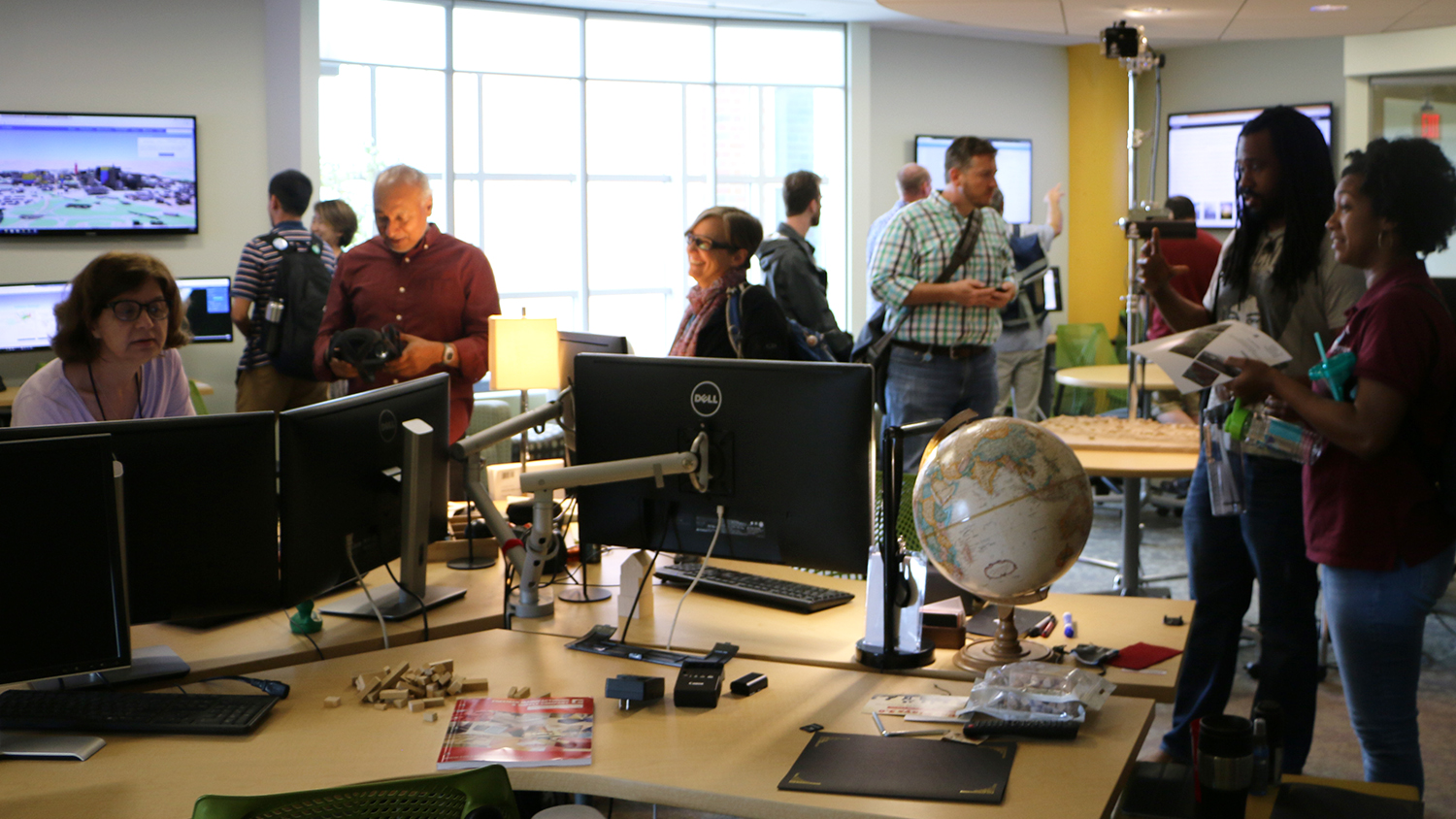What It Means To Be an EDC

Last fall, the world’s top GIS software company, Esri, invited the Center for Geospatial Analytics to join an elite group of global institutions in becoming an Esri Development Center. The distinction comes with special access to ArcGIS software, developer summits and Esri personnel, and distinguishes NC State University as home to one of only a few dozen EDCs worldwide. Esri established the program to recognize “a select few leading university departments that challenge their students to develop innovative applications based upon the ArcGIS platform.” At the Center for Geospatial Analytics, that means working at the cutting edge of desktop, web and mobile deployments of Esri technology and building collaborations to continually advance the student experience.
“Being an EDC gives our center permission to work under the hood on Esri code,” says Ross Meentemeyer, director of the Center for Geospatial Analytics. “It’s a great research opportunity for our graduate students and a gateway to building research partnerships.”
“One of the greatest benefits is being able to network with other institutions and have a direct line to Esri solution engineers,” adds Eric Money, the center’s associate director of professional education. “Connecting with them helps us get where we want to be faster.” He and center research associate Bill Slocumb are co-representatives of NC State’s EDC, serving as liaisons between Esri and the rest of the Center for Geospatial Analytics. Being part of an EDC, they emphasize, is a boon for keeping on top of the latest innovations, as exclusive monthly web meetings and free Esri instructor-led courses allow personnel from all EDCs to share best practices in course development and learn about emerging technologies on the ArcGIS platform. For example, our center is discovering how other universities are using high-performance computing to maximize efficiency, and other universities are “coming to us for ideas about curriculum,” Slocumb says. At the June EDC web meeting, Slocumb will deliver a presentation about the Center for Geospatial Analytics’ courses in web GIS, programming and data systems.
Another advantage of the EDC is the potential to improve information technology infrastructure. In the coming year, the Center for Geospatial Analytics and IT specialists at NC State will work with Esri’s Education Solution Engineers to streamline access to Esri software for faculty and students across the university.
The affiliation also affords opportunities for students to shine. A prime example is Ashwin Shashidharan, a Ph.D. student in the Department of Computer Science jointly advised by Meentemeyer and Raju Vatsavai (associate director of spatial computing). Each year, the Center for Geospatial Analytics can name an EDC Student of the Year and nominate that student for the international competition across all EDCs. After winning an international award for his computational steering research in 2016, Ashwin went on to intern at Esri in the summer of 2017 and then won the 2018 Esri Development Center Student of the Year award both locally from NC State and internationally from Esri as part of their global competition. The award will be conferred at the annual Esri International User Conference in San Diego in July. As the winner of the international prize, Ashwin will receive free travel and lodging for the User Conference and its associated Education Summit. His name, along with those of all future NC State winners, will be engraved on a plaque residing at the Center for Geospatial Analytics.
The only way to become an EDC is by invitation. After visiting NC State’s Center for Geospatial Analytics last October to speak at the center’s Geospatial Forum series, David DiBiase, Education Sector Lead for Esri’s Global Business Development, reached out to center director Ross Meentemeyer about the center becoming an EDC. “The center’s education and research offerings are most impressive,” he said in his invitation email. As part of his talk at NC State about the future of GIS, DiBiase lauded the center’s online programs, commenting: “Lifelong learning is a cornerstone of the geospatial technology competency model, and programs like yours that support lifelong learning will help GIS people continue to matter in the Internet of Things.”
The new partnership with Esri adds to a growing list of honors and affiliations garnered by the Center for Geospatial Analytics and NC State. The center is one of the six founding nodes of the global GeoForAll network, established by the OSGeo Foundation; the network currently includes over 100 laboratories dedicated to open principles in geospatial science, software and data. The National Geospatial-Intelligence Agency and U.S. Geological Survey have also designated the university as a Center of Academic Excellence in the Geospatial Sciences, in recognition of the Center for Geospatial Analytics’ pioneering programs. Says DiBiase, “I’m eager to demonstrate that GeoForAll and Esri are complementary, not competitive, in the modern geospatial tech ecosystem.”


